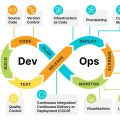- September 12, 2024
- Posted by: SouTech Team
- Category: Blog
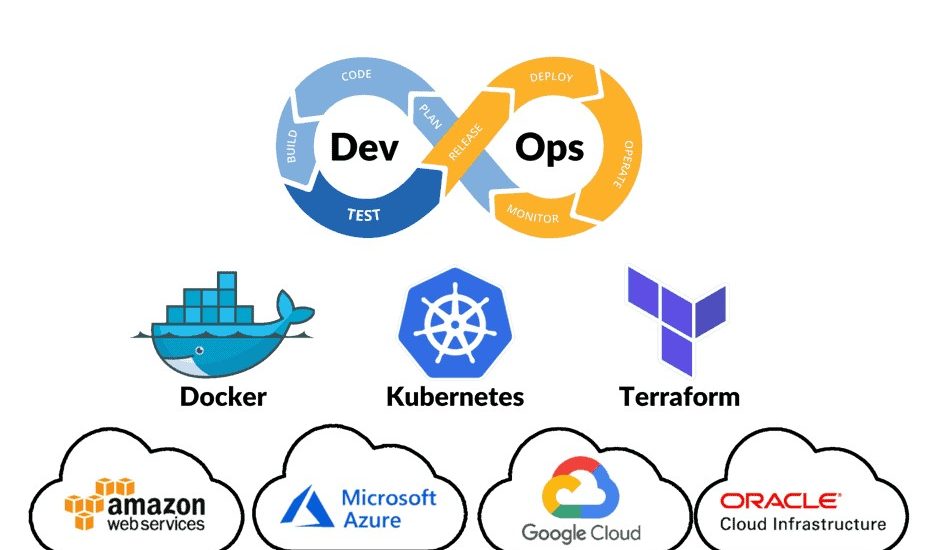
As technology rapidly evolves, businesses seek faster and more reliable ways to develop, deploy, and maintain applications. This need has led to the rise of DevOps, a transformative approach that combines software development (Dev) and IT operations (Ops) to shorten development cycles, increase deployment frequency, and create more reliable systems. If you’re looking to get started with a career in DevOps, this comprehensive guide will provide you with all the information you need, including the required skills, training, and career path.
Table of Contents
- What is DevOps?
- Why Pursue a Career in DevOps?
- Essential Skills for a DevOps Engineer
- Key DevOps Tools to Learn
- Steps to Start a Career in DevOps
- Certifications to Enhance Your DevOps Career
- DevOps Career Opportunities in Nigeria (Lagos, Abuja, Port Harcourt, Owerri, Delta) and Ghana
- Conclusion
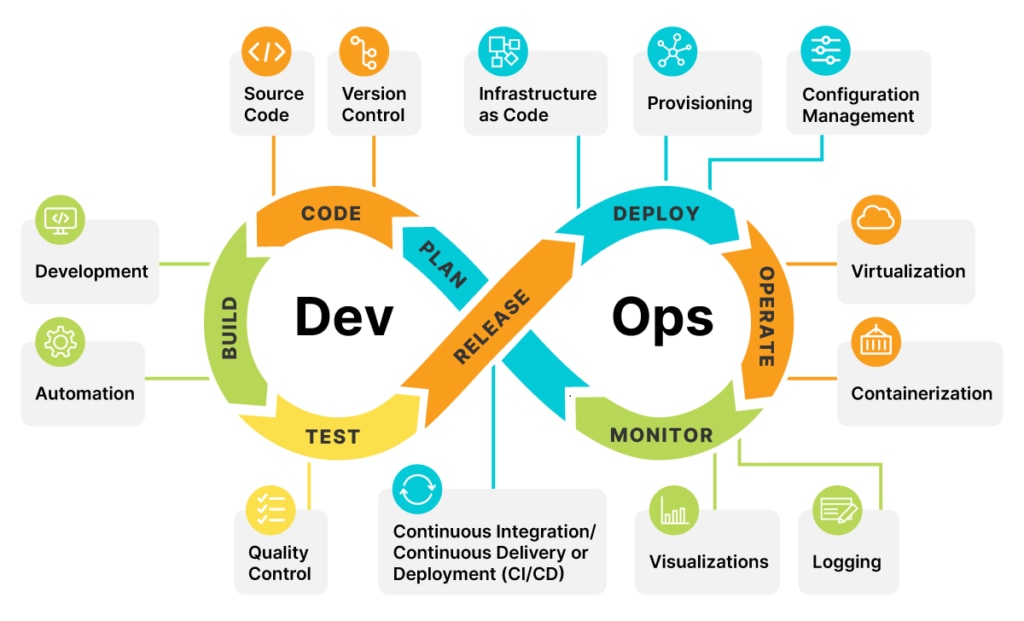 1. What is DevOps?
1. What is DevOps?
DevOps is a combination of development (Dev) and operations (Ops) practices aimed at automating and streamlining the processes between software development and IT teams. DevOps fosters a culture of collaboration, where both teams work together to develop, test, and release software faster and more reliably. This approach helps companies enhance software quality, reduce time to market, and address issues faster.
Some key principles of DevOps include:
- Automation: Streamlining tasks such as testing, integration, and deployment.
- Continuous Integration and Continuous Delivery (CI/CD): Automating the software release pipeline.
- Collaboration: Breaking down silos between development and operations teams.
- Monitoring and Feedback Loops: Continuously monitoring performance to improve systems.
2. Why Pursue a Career in DevOps?
The demand for DevOps engineers has surged in recent years, and it’s a field with substantial growth potential. Here are some reasons why a career in DevOps is attractive:
High Demand for DevOps Engineers
Many organizations are adopting DevOps to improve their software development lifecycle. This has led to a high demand for skilled DevOps professionals, not just in tech-heavy areas like the United States and Europe but also in emerging tech hubs like Lagos, Abuja, Port Harcourt, Owerri, Delta, and Ghana.
Competitive Salaries
DevOps professionals are among the highest-paid IT professionals globally. In Nigeria and Ghana, DevOps engineers are offered competitive salaries and attractive benefits.
Diverse Career Opportunities
DevOps engineers work in various industries, including finance, healthcare, telecommunications, and e-commerce. You can work as a DevOps engineer, automation specialist, system administrator, cloud engineer, or DevSecOps specialist.
3. Essential Skills for a DevOps Engineer
To excel in a DevOps career, you need a mix of technical and soft skills. Here are the critical skills required for becoming a successful DevOps engineer:
a. Programming and Scripting
DevOps engineers need to automate repetitive tasks, so knowledge of programming and scripting is essential. Common programming languages include:
- Python
- Ruby
- Java
- Gosure
Additionally, proficiency in shell scripting (Bash, PowerShell) is highly beneficial for automation tasks.
b. Knowledge of Operating Systems
You must be comfortable working with Linux and Windows environments. Linux is especially crucial because it’s widely used in server environments, cloud platforms, and containerization technologies like Docker and Kubernetes.
c. Networking and Security
Understanding networking concepts and security best practices is vital. DevOps professionals often handle cloud networks, virtual private networks (VPNs), and security configurations to protect the infrastructure.
d. Cloud Computing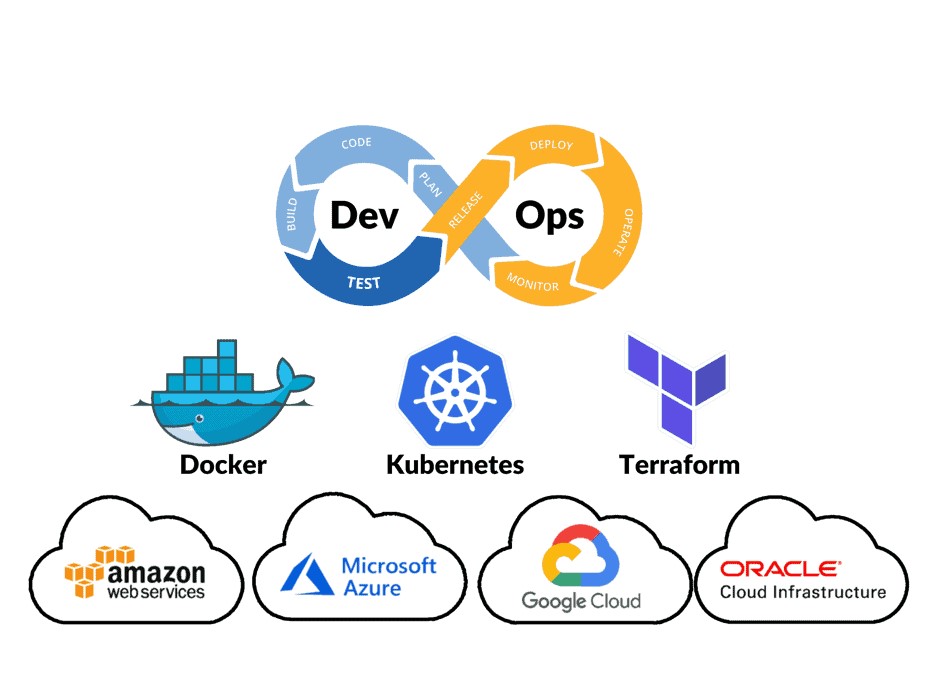
Cloud platforms are central to modern DevOps practices. A good DevOps engineer should be familiar with cloud providers like:
- Amazon Web Services (AWS)
- Google Cloud Platform (GCP)
- Microsoft Azure
Learning how to deploy, manage, and monitor applications on the cloud is crucial for a DevOps career.
e. Containers and Orchestration
DevOps professionals should know how to work with containerization tools like Docker and orchestration platforms like Kubernetes. Containers allow applications to run consistently across different environments, and Kubernetes is essential for managing these containers at scale.
f. Continuous Integration/Continuous Deployment (CI/CD)
You must master CI/CD tools like Jenkins, GitLab CI, or CircleCI to automate the development pipeline and ensure seamless integration and deployment.
g. Version Control Systems
Understanding version control systems like Git is essential for tracking changes in the codebase, collaborating with teams, and managing branches.
4. Key DevOps Tools to Learn
To become proficient in DevOps, you need to familiarize yourself with various tools. Here’s a list of essential DevOps tools:
- Jenkins – CI/CD pipeline automation
- Docker – Containerization platform
- Kubernetes – Container orchestration tool
- Git – Version control system
- Terraform – Infrastructure as Code (IaC) tool
- Ansible – Configuration management tool
- Prometheus & Grafana – Monitoring and visualization tools
- Cloud Providers – AWS, GCP, or Azure for cloud services
5. Steps to Start a Career in DevOps
Starting a career in DevOps requires careful planning and structured learning. Here are the steps to get started:
a. Learn the Basics of DevOps
Begin by understanding the fundamental principles of DevOps: automation, collaboration, and continuous improvement. Read blogs, watch tutorials, and take introductory courses on platforms like Udemy or Coursera.
b. Learn a Programming Language
Pick a language like Python or Go and start coding. This will help you develop automation scripts, which are crucial in DevOps.
c. Get Familiar with Version Control
Learn Git and how to manage repositories, branches, and pull requests. Practice collaborating with others through GitHub or GitLab.
d. Build a CI/CD Pipeline
Create a project where you can set up a CI/CD pipeline. Use Jenkins or GitLab CI to automate the build, test, and deployment process.
e. Learn Infrastructure as Code (IaC)
Familiarize yourself with Terraform or Ansible and practice provisioning infrastructure on cloud platforms like AWS or GCP.
f. Get Hands-on with Docker and Kubernetes
Start by containerizing a simple application using Docker, then deploy it on a Kubernetes cluster. Learn how to manage and scale containers using Kubernetes.
g. Earn DevOps Certifications
Certifications can boost your credibility in the job market. Some popular certifications include:
- AWS Certified DevOps Engineer
- Google Professional DevOps Engineer
- Certified Kubernetes Administrator (CKA)
6. Certifications to Enhance Your DevOps Career
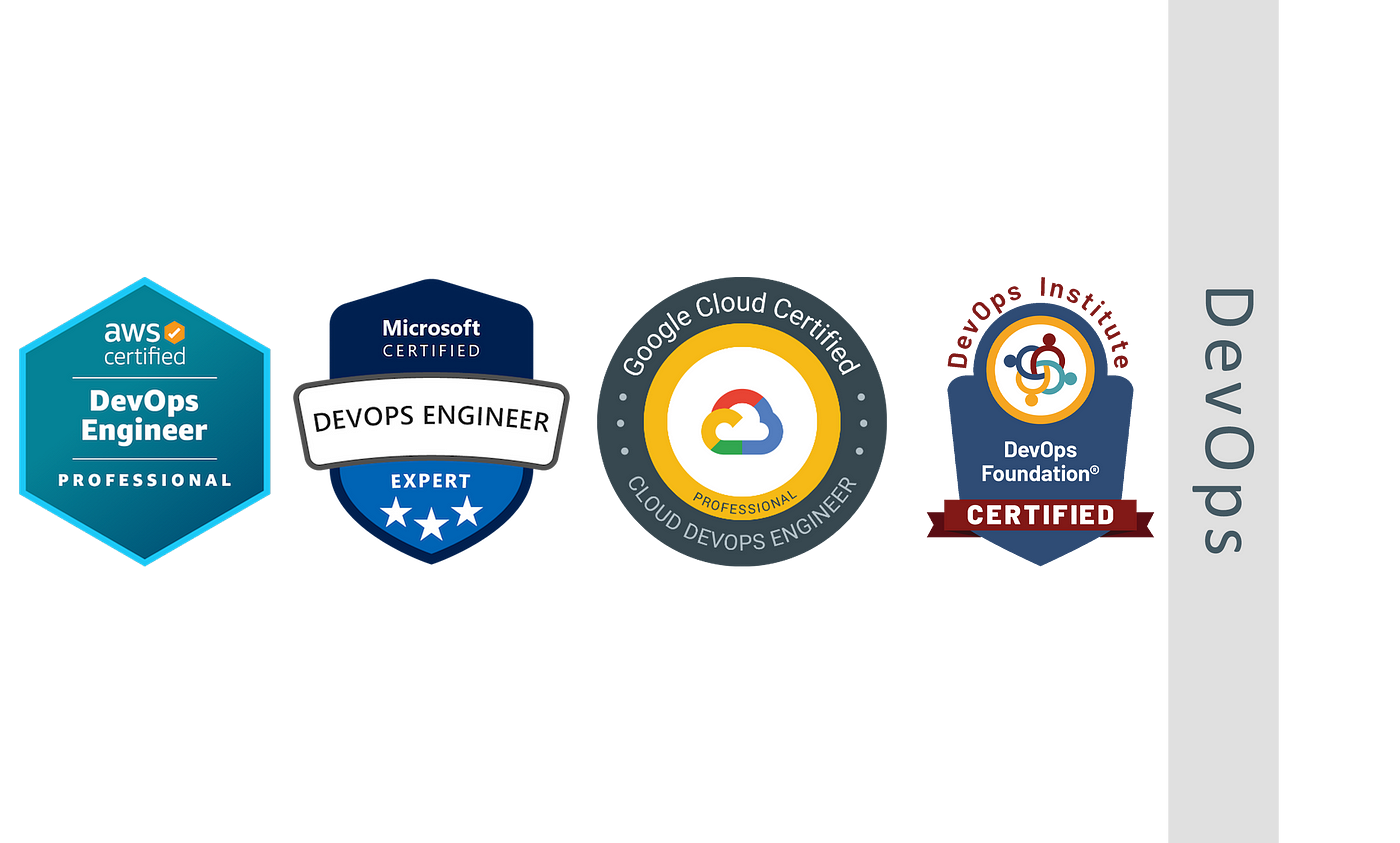
Certifications can validate your skills and help you stand out in the competitive job market. Here are some recommended DevOps certifications:
- AWS Certified DevOps Engineer: Specialize in deploying and managing applications on AWS.
- Google Professional DevOps Engineer: Learn to use GCP tools and services for managing infrastructure.
- Microsoft Certified: DevOps Engineer Expert: Focus on Azure DevOps practices.
- Certified Kubernetes Administrator (CKA): Master Kubernetes for container orchestration.
- HashiCorp Certified: Terraform Associate: Demonstrate your expertise in Infrastructure as Code using Terraform.
7. DevOps Career Opportunities in Nigeria (Lagos, Abuja, Port Harcourt, Owerri, Delta) and Ghana
The tech ecosystem in Nigeria and Ghana is growing rapidly, and the demand for DevOps engineers is increasing across cities like Lagos, Abuja, Port Harcourt, Owerri, Delta, and Accra in Ghana. Many Nigerian and Ghanaian businesses are adopting cloud technologies and need skilled DevOps professionals to manage their infrastructure efficiently.
a. Lagos and Abuja
Lagos and Abuja are tech hubs where many startups, fintech companies, and enterprises operate. These cities offer lucrative opportunities for DevOps engineers, particularly in the finance, healthcare, and telecom sectors.
b. Port Harcourt and Owerri
In cities like Port Harcourt and Owerri, oil and gas companies are adopting DevOps practices to modernize their IT infrastructure. This provides a unique opportunity for DevOps professionals in non-traditional sectors.
c. Delta
Delta is home to a growing number of SMEs (small and medium-sized enterprises) that are moving towards digital transformation, opening up DevOps roles to support cloud and automation initiatives.
d. Ghana
Accra and Kumasi are at the forefront of Ghana’s tech boom. With many Ghanaian companies focusing on digital innovation, DevOps roles are increasingly in demand, especially in fintech and e-commerce.
8. Conclusion
A career in DevOps offers exciting opportunities for those interested in bridging the gap between development and operations while working with cutting-edge technologies. Whether you’re based in Nigeria or Ghana, the demand for skilled DevOps professionals is rapidly growing. By acquiring the right skills, learning essential tools, and earning industry-recognized certifications, you can kickstart a successful career in DevOps.
DevOps not only offers competitive salaries but also provides the chance to work on impactful projects, enhance your technical expertise, and secure a future-proof career in the tech industry.
By following these steps and focusing on continuous learning, you can begin your journey to becoming a DevOps engineer.
Reach out to us today to begin your DevOps Career.

